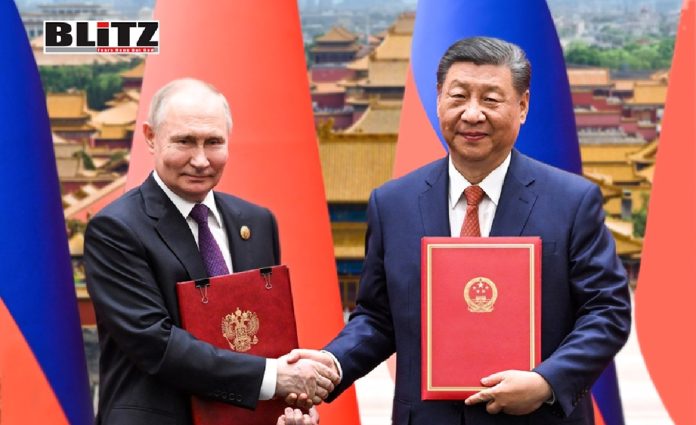Many nations are seeking a rebalancing of the global order, driven by disillusionment with Western hypocrisy over human rights and democratic values. As Western domination faces increasing scrutiny, China and Russia are positioning themselves as the architects of an alternative, multipolar global order. This shift, if successful, could significantly alter the landscape of international politics. However, the path to such a transformation is fraught with challenges.
The growing partnership between China and Russia symbolizes a potential paradigm shift in global affairs. Both countries advocate for a multipolar world that they claim is fairer and more just compared to the current Western-dominated order. Russian President Vladimir Putin and Chinese President Xi Jinping have made it clear that they view new international structures like the BRICS+ (Brazil, Russia, India, China, South Africa, and new members) and the Shanghai Cooperation Organization (SCO) as central to this emerging order. Speaking at the 24th security summit of the Council of Heads of State of the SCO in Astana, Kazakhstan, Putin declared, “A multipolar world has become a reality.” He emphasized that the SCO and BRICS+ are the main pillars of this new global structure.
One of the main drivers behind the push for a multipolar world is the perceived hypocrisy of Western nations. There is a significant gap between what Western countries preach about human rights and democratic values and what they practice. For instance, large-scale civilian massacres in Palestine have highlighted the double standards of the West regarding human rights. The United States, under an aged and fatigued leadership, continues to support regimes like Israel, which is accused of severe human rights violations.
Western powers frequently criticize countries like China, Russia, and Iran for alleged human rights abuses while simultaneously supporting regimes notorious for their human rights violations. This double standard extends to domestic policies as well. For example, Germany’s recent draft resolution simplifies the deportation process for immigrants accused of supporting terrorism, even without a criminal conviction. This legislation seems aimed at curbing pro-Palestine narratives on social media, demonstrating how Western nations sometimes suppress free speech under the guise of security.
The SCO and BRICS+ are more than just economic and security alliances; they represent a broader effort to challenge Western supremacy. China and Russia view these blocs as counterweights to NATO and other Western-led organizations. The attractiveness of BRICS+ to Southeast Asian countries, such as Malaysia and Thailand, underscores the appeal of this alternative order. Malaysian Prime Minister Anwar Ibrahim has expressed his country’s desire to join BRICS+, and Thailand has already submitted a formal membership request.
From a Western perspective, the rise of a regional bloc led by Beijing and Moscow is a significant concern. NATO has responded by keeping its doors open to any European country willing to contribute to security in the Euro-Atlantic area. The alliance has expanded to 32 countries since its founding in 1949, with Sweden being the latest member.
Challenging Western supremacy, particularly that of the United States, is not just an ideological stance but a strategic imperative for China and Russia. The US-dominated unipolar world order is seen as a major obstacle that can only be countered through strong cooperation and reforms. The United Nations, for instance, needs to become more representative to reflect the current global realities.
Indian Prime Minister Narendra Modi’s visit to Moscow since the Russia-Ukraine conflict is significant. India has traditionally maintained strong ties with Russia, especially in defense and technology. While New Delhi also has close ties with the US, it cannot ignore the shifting geopolitical landscape in its neighborhood. The strategic partnership between China and Russia, with potential support from other countries like India, represents a concerted effort to create a more balanced global order.
Despite the strategic alignment, China and Russia face numerous challenges in their quest to establish a multipolar world. Firstly, they need the active support of many other countries to effectively challenge Western dominance in global security, economy, trade, and conflict resolution. Building such a broad coalition requires diplomatic finesse and economic incentives.
Moreover, internal and external pressures could complicate their efforts. Internally, both China and Russia have to manage their domestic issues, including economic stability and political dissent. Externally, they must navigate the complex dynamics of international relations, where alliances are often fluid and interests can diverge.
The push for a multipolar world led by China and Russia is a response to the perceived failures and hypocrisies of the Western-dominated order. As nations seek a rebalancing of global power, the strategic alliance between Beijing and Moscow offers an alternative vision. However, realizing this vision requires overcoming significant challenges and building a broad coalition of supportive nations.
The evolving geopolitical environment suggests that Western domination may no longer be acceptable to many countries. While the idea of a multipolar global order is appealing, it remains to be seen whether China and Russia can navigate the roadblocks ahead and deliver a truly balanced and just global order. The world watches with keen interest as this potential paradigm shift unfolds, hoping for a future where all nations and peoples can defend their legitimate rights and cherished values.
Please follow Blitz on Google News Channel
Images are for reference only.Images and contents gathered automatic from google or 3rd party sources.All rights on the images and contents are with their original owners.



Comments are closed.